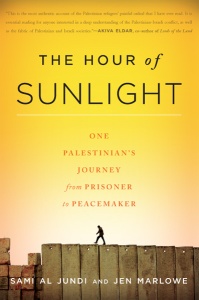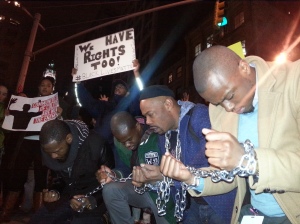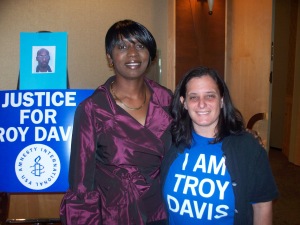(Below, please find reflections from my friend Kenneth Foster, who is currently serving a life sentence in Texas and had previously been in Texas’s death row. Spoiler alert: my favorite quote is at the end: “Remembering and forgetting are both political acts”)
Imperialism is a word that many of us are familiar with. While the word itself may not be ancient, its ideology has been around for eons. And while we may think of wars over-seas, armies encroaching other territories, war ships when we think of Imperialism—what happens when it becomes local? Domesticated? How do we recognize it? How do we see it upon ourselves as we see it inflicted upon other places?
The average citizen does not realize the stretch of the U.S. military which executes Imperialism to precision, and affords its allies to do the same. Does the average citizen know that there’s only around 46 countries (if not less by now) with NO U.S. military presence? Thus making it around 156 countries with U.S. troops. Then 63 countries (give or take a few) with U.S. military bases and troops? How about the fact that the Pentagon currently rents, or owns, around 702 over-seas bases in about 130 countries and has at least another 6,000 bases in the United States and its territories. That doesn’t even scratch the surface.
But what happens when this mentality turns in? It is no longer extended outwards, but is focused inwards? This is not just a nod towards the advancements in technology which brings more surveillance, but brings a force that crashes down on the heads of its every day citizens. What we are seeing in the news every day—unarmed citizens being gunned down with no charges being brought, more police presence, more laws attacking citizens’ rights to organize, exercise free speech, vote —is not just being “tough on crime,” but is an unavoidable manifestation of what has been practiced years upon years by this government.
There’s two places I see these behaviors being carried out on a daily basis, though they are two places to have unlikely similarities: Palestine and the American prison system. Before you shake that off, understand that there are five main institutions in the world: mental, educational, religious, military and penal. All of which share commonalities that might put a shiver in your spine. The educational, however, separates itself from the other four because it is an institution that has become a social vehicle used to publicly establish rank and class. Yet, the other four possess a dark side that dabbles in the physical (and sometimes violent) which seeks to bend the mind and spirit. Especially the latter two institutions.
The military and penal institutions are ones that mirror each other with a chilling effect. They both are built on bringing in a person, breaking them down from their old self, making them the same as everyone else, instilling brutal discipline and order, and even more brutal punishment if there is any deviation from protocol. These behaviors have become the breath of the American society. Is it that hard to believe when America possesses the most military bases in the world AND the most prisoners?
Prisons have become breeding grounds for the Imperialistic mentality. Prisoners-by law-are deemed non-citizens, therefore they are nothing to be respected. We see these same attacks being carried out in places like Palestine, on the West Bank, where homes are bulldozed, people are brutalized. How vile is it that prison authorities carry somewhat the same mentality towards its prisoners that Zionists did of Palestinian people, that it is “a land without people for a people without land.”
When people are viewed in such a scope, they are no longer people. This is why we see such indoctrination inside the military and penal institutions, because if you extend to a person the basic elements of humanity (compassion, empathy, sympathy) than they can pull themselves from under any rock.
Prisons, too, are becoming more technologically advanced with cameras filling the prisons, X-ray machines, metal detectors, urine analysis, K-9 dogs trained to sniff out narcotics and cell phones. Prisons are even filled with check points where prisoners must show ID and/or a pass to go from one part of the unit to the other. Accompanying it is orders barked at them to stay in proper uniform, stay on certain sides of the walkways, no talking! A form of control used to destroy moral, free thinking, happiness. Not much different from the military.
Now these tactics go into the neighborhoods where youths can’t go to certain areas without scrutiny. Methods like ‘stop and frisk’ are deployed to attack the every day citizen. But it’s gone from red and blue colors to who is wearing the kuffiyeh, the hijab, who is the dissident? Woe to the Arab-American who is the new nigger of the U.S.A.
As settlements rise in Palestine, American prisons continue to boom. Like twins they continue to sprout side by side. Tactics to destroy the undesired people continue to bloom—more restrictions, more oppression, more violence, more crooked laws. Kinda hard to tell which group I’m speaking of, isn’t it?
And that is my point! Imperialism is an entity without a face. It is a “thing” that can be used in any border, in any institution and by any person/group with heart cold enough to carry its flag.
We are lost in a sea of rockets, troops and machinery. We are drowning under bars, walls and batons. In a world of wars with rapid firing bullets, the only thing we may have that can keep up is words. Which means we have to fire off 1,000 words to very 100 bullets. This is why plays like “There Is A Field” and books like “I Am Troy Davis” become essential. REMEMBERING is key to humanity’s survival, because remembering and forgetting are both political acts. It’s an act that the penal and military figures know well, because when they can erase what you once were and make you something new, something trained, something robotic, then they can reign in your non-existence. Where we lack the tanks and bullets, we have to remember the power of the core of humanity. We live those on through art, poetry, music. Memory and documentation require imagination which rejects amnesia. A spirit in opposition, rather than in accommodation.
Recognizing the ailments is the first step to treatment. When people think fanatics, it’s not just people who blow themselves up. It’s also people that murder and destroy under the guise of technology or in the name of a better God.
So, as we face the same apparent inevitable Armageddon, what are we to say in the face of all we’ve done? Probably—“Mercy!”
When all along “Justice” would have saved us all.
–Kenneth Foster Jr
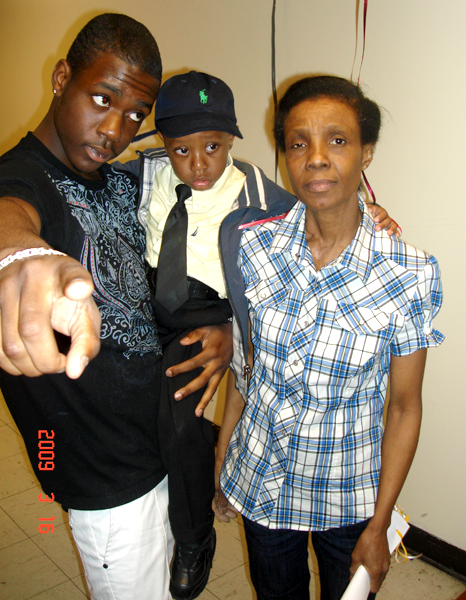

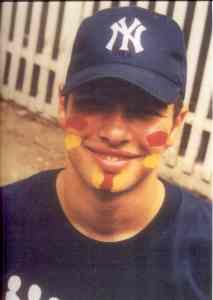 idealism is disconnected from reality. Like I’m just a dreamer. However, to me, idealism is what shapes reality. Ideals are our north stars. They guide us, give us direction, provide a point of reference. Ideals have practical applications. They are governing principles…
idealism is disconnected from reality. Like I’m just a dreamer. However, to me, idealism is what shapes reality. Ideals are our north stars. They guide us, give us direction, provide a point of reference. Ideals have practical applications. They are governing principles…